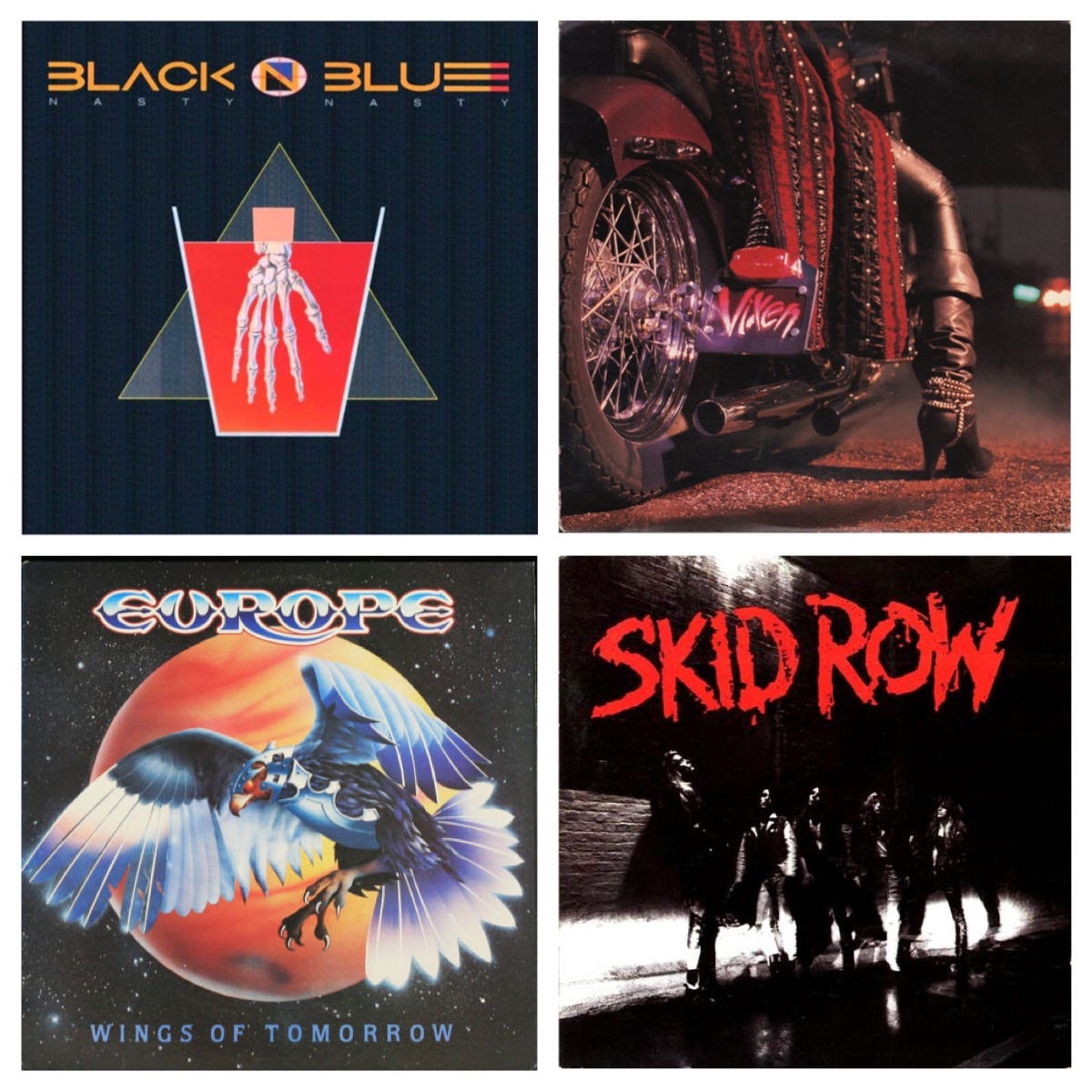From 5x Platinum to Total Flops: September’s Metal Showdown
Skid Row’s monster debut battles three overlooked gems with KISS ties, Journey connections, and Sweden’s rawest hour—which deserves the spotlight?
Ready to dive into four albums that tell different stories about 80s metal’s sprawling landscape? This month’s tournament spans the glam spectrum—from platinum superstars to industry insider projects that somehow slipped through the cracks. Each record here was suggested because it reveals something essential about what made 80s metal so damn vital.
But here’s the real question: which one deserves a deep dive episode and another moment in the spotlight? That’s where you come in.
Black ’n Blue - Nasty Nasty (1986)
Suggested by Timothy Minneci
Timothy nailed the intrigue factor: “Features members of KISS, a Jonathan Cain written song, and Ron Keel pops up.” But there’s so much more to unpack here. Ever wonder how Tommy Thayer ended up in KISS? It starts with this album. When Gene Simmons produced this Portland band’s third album, he wasn’t just making music—he was building relationships that would reshape KISS decades later.
Here’s the kicker: Simmons literally recycled his own riffs for this record. The title track “Nasty Nasty” uses the exact same guitar lick that would later become KISS’s “Domino” from Revenge. Timothy’s right about the all-star connections—Jonathan Cain from Journey wrote “I’ll Be There for You,” and Ron Keel’s appearance creates this weird supergroup moment that somehow flew under everyone’s radar. This wasn’t polished hair metal—it was rawer, grittier, and more aggressive than their previous efforts, but the album flopped commercially. For KISS historians and metal completists, it’s essential listening that Timothy clearly understands.
Vixen - Vixen (1988)
Suggested by Keith P Miller
Keith gets it: “These girls rocked hard! Big time guitar solos, groovy bass lines and muscular drumming with powerhouse vocals.” He’s absolutely right to focus on their musical chops rather than getting bogged down in later controversies. Keith zeroes in on the album’s secret weapon—Richard Marx co-writing “Edge of a Broken Heart,” calling it “a phenomenal song and a great single which strapped a rocket to this album.”
Keith’s take is spot-on. Marx, the soft rock king himself, wrote the music in a hotel room “in a heartbeat,” then called his friend Fee Waybill from The Tubes to handle lyrics. The result hit #26 on the Billboard Hot 100 and became MTV gold. But Keith’s right that the deeper cuts matter just as much—Jan Kuehnemund’s guitar solos on tracks like “American Dream” prove that female shredders never got the respect they deserved. As Keith puts it, “Vixen was the real deal,” regardless of debates about outside songwriters.
Europe - Wings of Tomorrow (1984)
Suggested by Chip
Chip asks the perfect question: “Did you know Europe put out two albums before ‘The Final Countdown’?” He’s thinking like a true music detective, wondering if this is “a Def Leppard-like situation where the earlier stuff was more raw but showed hints at what would come” or if Europe completely changed their sound for radio play.
Chip’s instincts are dead-on. This captures Europe before “The Final Countdown” made them household names and sold 6 million copies worldwide. Wings of Tomorrow sold modestly but shows the rawer, more aggressive Europe that purists prefer. As Chip suspected, this was their last independent release before major label stardom, and you can feel them breaking through to something bigger. Songs like “Scream of Anger” and the title track showcase the killer riffs from John Norum and soaring vocals from Joey Tempest that had nothing to do with keyboards or synthesizers. Chip’s right—they’d never be more metal than they were here.
Skid Row - Skid Row (1989)
Suggested by Jake Miller
Jake knows his metal history: “This album was huge and I think Skid Row’s stuff stands up better than most bands of the time.” He’s not wrong—this hit #6 on the Billboard 200 and went 5x platinum. But Jake’s deeper insight is key: he saw them “tour with Guns n Roses off of this one” and recognizes that their sound had more authenticity than most hair metal.
Jake nails why this record matters beyond the numbers. Sebastian Bach’s vocals had a dangerous edge that set them apart from the Sunset Strip pretty boys, and the band’s songwriting proved hair metal could have both hooks and credibility. Released in January 1989, this became the last great hair metal success story before grunge changed everything. The singles “Youth Gone Wild,” “18 and Life,” and “I Remember You” dominated MTV and radio, but Jake’s right that the deep cuts reveal a band with more grit than their image suggested. Dave Sabo’s childhood friendship with Jon Bon Jovi got them their break, but their performances earned them legitimacy.
Listen, Vote, Suggest
Timothy, Keith, Chip, and Jake have laid out four compelling cases for albums that represent different paths through 80s metal’s diverse landscape. Black ’n Blue shows the industry connections that shaped the scene. Vixen proves female-fronted metal could rock as hard as anyone. Europe captures a band before they conquered the world. Skid Row represents the commercial peak of hair metal done right.
What forgotten 80s metal masterpiece should we unearth next? Share your suggestions and keep the exploration alive.




Thanks for the kind words, and not surprisingly, I voted for Skid Row for the reasons mentioned.
Black n’ Blue 👍